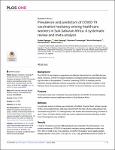Prevalence and predictors of COVID-19 vaccination hesitancy among healthcare workers in Sub-Saharan Africa: A systematic review and meta-analysis
Date
2023Author
Kigongo, Eustes
Kabunga, Amir
Tumwesigye, Raymond
Musinguzi, Marvin
Izaruku, Ronald
Acup, Walter
Metadata
Show full item recordAbstract
Background
The COVID-19 vaccination is regarded as an effective intervention for controlling the pan demic. However, COVID-19 vaccine hesitancy is hampering efforts geared towards reduc ing the burden of the pandemic. Therefore, examining COVID-19 hesitancy and its
predictors among healthcare workers is essential to improving COVID-19 uptake. In sub Saharan Africa, the pooled proportion of COVID-19 vaccine hesitancy is yet to be known.
Purpose
The present study was to estimate the pooled proportion of COVID-19 vaccine hesitancy
and its predictors among healthcare workers in Sub-Saharan Africa.
Methods
A systematic search of articles was conducted in PubMed, Science Direct, African Journal
Online, and Google Scholar. Data was extracted with the help of Excel. Data analysis was
conducted using STATA 17. Heterogeneity in the studies was assessed using Cochrane Q
and 12 tests. A random effects model was used to examine the pooled estimates to deter mine if heterogeneity was exhibited.
Results
A total of 15 studies involving 7498 participants were included in the final analysis. The
pooled prevalence of COVID-19 vaccination hesitancy among healthcare workers was
46%, 95% CI (0.38–0.54). The predictors of COVID-19 hesitancy were negative beliefs
towards vaccine 14.0% (OR = 1.05, 95% CI: 1.04, 1.06), perceived low risk of COVID-19 infection 24.0% (OR = 1.25, 95% CI: 1.23, 1.28), and vaccine side effects 25.0% (OR =
1.23, 95% CI: 1.21, 1.24).
Conclusion
The data revealed generally high hesitancy of COVID-19 vaccine among health workers in
Sub-Saharan Africa. Future COVID-19 adoption and uptake should be improved by national
and individual level efforts. In Sub-Saharan Africa, it is crucial to address the myths and
obstacles preventing healthcare professionals from accepting the COVID-19 vaccination as
soon as feasible since their willingness to get the vaccine serves as an important example
for the broader public.
URI
https://doi. org/10.1371/journal.pone.0289295http://ir.lirauni.ac.ug/xmlui/handle/123456789/743

